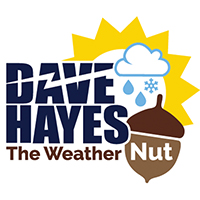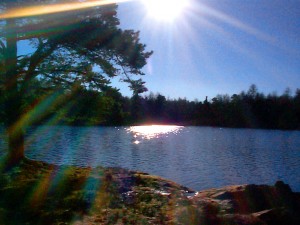Oxygen is freely available in a power outage, but water may not be. Since water is most vital to sustaining life in the absence of modern conveniences, it makes sense to start this blog and page on the topic of Water.
Power Outages
When it comes to severe weather events, the most notable impact human beings can experience in modern civilization involves power outages. These outages are usually related to powerful snowstorms and blizzards, or severe summer weather such as thunderstorms and tornados. In addition, infrastructural brown-outs and black-outs have happened, and will most certainly happen again in the future from time to time. Click to read about the worst black out in United States history.
Despite these infrastructural causes, the main weather impacts are related to high sustained and gusty winds, heavy wet snow, and/or freezing rain that accumulates on power lines, weighs them down, and causes them to snap. Heavy rain, lightning bolts, and heavy snow and ice can also cause power transformers to blow, causing a loss in power. In the case of severe summer weather, straight-line winds from severe thunderstorms can bring down power lines, utility poles, and the trees that knock down these lines and poles.
Many times, these outages are very short-term, and can last anywhere from several hours, to over a day. However, in the case of tornados, like the Springfield MA tornado in 2011, major Nor’easters like the Halloween Nor’easter of 2011, or blizzards like the Blizzard of ’78, these outages can last anywhere from 3 days to as long as 2 weeks, or more.
Have A Plan
The question is, how prepared are you for the next time it happens? What’s your plan? Some people believe that you just deal with it, but I am of the belief that if you have a plan, you can be optimally helpful to your family, and to your neighbors. The more people that develop a capacity, the better, in my opinion.
Cities and towns would do well to more proactively prepare in this way as well, if they don’t do so already. By more actively optimizing their budgets to help their citizens in these cases, the public can be protected in an optimal way as possible during such severe events.
Normalcy Bias
Losing power for extended periods of time is not a case of “if”, but “when”. We live in New England, which is notoriously a region that features dramatic weather of all kinds, including blizzards, tornados, severe thunderstorms, earthquakes, and severe ice storms, to name a few.
This is a good moment to insert into your consciousness the concept of the “normalcy bias”. This term refers to be the human tendency to assume that conditions that have prevailed up to a certain point in our lives, will always continue to do so.
We live in changeable times.
It’s important from time to time to question your assumption that the modern conveniences we normally take for granted, will always be there for us, forever, without disruption. More likely than not they will, sure, but to ASSUME this could prove to be a grave mistake that keeps you from having a sound Preparedness Plan. I’m not saying you should become a Doomsday Prepper like the recent cable series, but I am saying that to adopt Preparedness Planning is wise, prudent, and will prove useful over time. It just makes logical, common, good sense.
Water is Priority #1 for Life
WATER IS THE MOST IMPORTANT RESOURCE FOR HUMAN LIFE, aside from oxygen. Therefore, any prudent Preparedness Plan includes as its cornerstone and center, a method for obtaining, filtering, storing, and using water.
It’s been said that human beings can live for months without food if necessary, but we can only last a few days without good, clean, potable water.
Obtaining Water
When you know the likelihood exists for extreme weather, filling a clean bath tub can be a great first step to take. This ensures you have some drinkable water, it allows you to use this water to flush toilets, to clean with, to cook with, and to bathe with. Most tubs hold around 30 gallons of water on average. You should plan on average to use 3-5 gallons per person per day for drinking, washing, cooking, flushing, bathing, and cleaning.
Storing Water
A second step would be to obtain some large 5-gallon water jugs. I have four of these myself. Always thoroughly clean your water containers before use. Storing these in a cool dark place is the best way to go. Some people use iodine or chlorine tablets to purify the stored water. I don’t claim to be a preparedness expert, but you can click on the following link to begin your journey of learning more about water purification. Changing the water out every 6 to 12 months might be a good idea as well, if you choose to store long term.
It’s a good idea to know where the natural water sources are for your area. I live near the CT River, and while it’s a schlep, I’m aware of the water bodies near me, and you should too. This brings me to the third step you might want to consider.
Filtering Water
You might not need to spend a lot of time on purifying water if you have a super high quality water filter. I have a Big Berkey, and it’s fantastic. You can pour pond water into that filter, and you will get out potable, clean water, because the filtration system is of such high quality. Brita’s are ok, but do not compare to these professional grade filters. But if all you have is a Brita, that can work. The Cadillac of water filters is the Katadyn brand filters. I am of the firm belief that every single municipality/city/town should have a few of the top of the line Katadyns. They are pricey, but they are the best water filters money can buy.
Conclusion
Water is the single most important resource to human life on the planet next to oxygen. I know of people who had no power for 2 weeks during the Halloween Nor’easter. Life gets very hairy after a couple days without power, and clean potable water (along with supplies of food, light, and heat) should be the cornerstone of any preparedness plan.
Affiliate Link Disclosure
In full disclosure, the links above are Amazon affiliate links. That means if you click on them and make a purchase I make a commission. Prices are exactly the same for you. Affiliate links help me pay for my time and expenses in operating the site. They encourage me to keep on keeping on with developing the site (which I really love) so I GREATLY appreciate when you use them. And I ONLY endorse products that I think will be of value to you.

